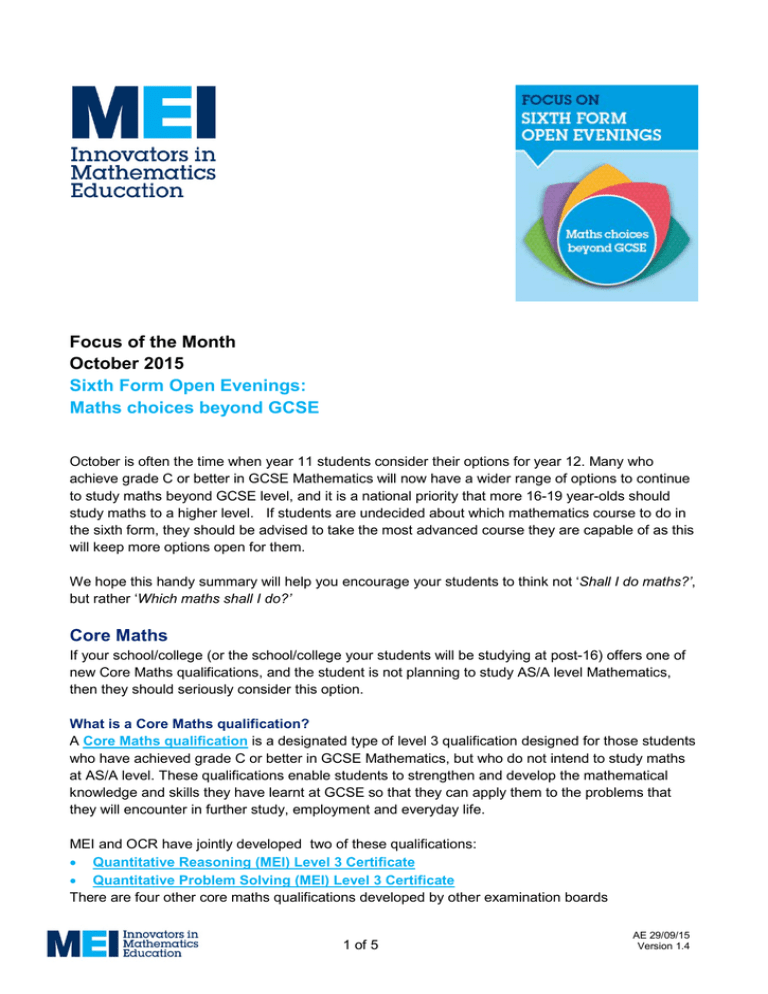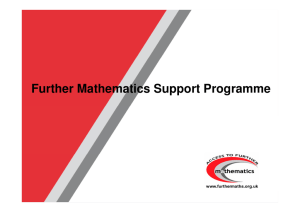Focus of the Month October 2015 Sixth Form Open Evenings:
advertisement

Focus of the Month October 2015 Sixth Form Open Evenings: Maths choices beyond GCSE October is often the time when year 11 students consider their options for year 12. Many who achieve grade C or better in GCSE Mathematics will now have a wider range of options to continue to study maths beyond GCSE level, and it is a national priority that more 16-19 year-olds should study maths to a higher level. If students are undecided about which mathematics course to do in the sixth form, they should be advised to take the most advanced course they are capable of as this will keep more options open for them. We hope this handy summary will help you encourage your students to think not ‘Shall I do maths?’, but rather ‘Which maths shall I do?’ Core Maths If your school/college (or the school/college your students will be studying at post-16) offers one of new Core Maths qualifications, and the student is not planning to study AS/A level Mathematics, then they should seriously consider this option. What is a Core Maths qualification? A Core Maths qualification is a designated type of level 3 qualification designed for those students who have achieved grade C or better in GCSE Mathematics, but who do not intend to study maths at AS/A level. These qualifications enable students to strengthen and develop the mathematical knowledge and skills they have learnt at GCSE so that they can apply them to the problems that they will encounter in further study, employment and everyday life. MEI and OCR have jointly developed two of these qualifications: • Quantitative Reasoning (MEI) Level 3 Certificate • Quantitative Problem Solving (MEI) Level 3 Certificate There are four other core maths qualifications developed by other examination boards 1 of 5 AE 29/09/15 Version 1.4 When is Core Maths a good choice to make? A Core Maths qualification is a good choice for all students with a good pass at GCSE who do not wish to take AS/A level Mathematics. It is particularly relevant for students whose other subject choices include some use of maths, e.g. A levels in Psychology, Geography, or level 3 qualifications in vocational subjects such as Construction, Business. Even those students pursuing arts courses would benefit from taking Core Maths as evidence of competence in applying mathematical thinking boosts employability in almost all careers. Core Maths: • helps students maintain and further develop valuable mathematical skills for university and employment; • helps with the mathematical elements of other level 3 courses, including humanities and social sciences; • builds valuable skills through an emphasis on mathematical problem solving in real life contexts. How can I get help with offering Core Maths? MEI provides CPD to support Core Maths. Resources for OCR/MEI Core Maths qualifications are available to centres free of charge, thanks to sponsorship from OCR. MEI Critical Maths resources, relevant to all Core Maths specifications, are also freely available, thanks to DfE funding. Presentations about the qualifications and example video lessons are available on YouTube. The Core Maths roadshow provides students and teachers with a taster of Core Maths at a live event. How can I get help with promoting Core Maths to students? The Core Maths Support Programme provides lots of materials to help you with this. 2 of 5 AE 29/09/15 Version 1.4 AS/A level Mathematics When is AS/A level Mathematics a good choice to make? AS/A level Mathematics is a good choice to make for any student who has achieved grade B or better in GCSE Mathematics (in some cases grade C). It is particularly relevant for those students taking science subjects and/or those who intend to take a mathematically rich degree or higher apprenticeship. AS/A level Mathematics: • • • • • keeps options open for a wide range of university courses; is essential for entry to many degrees including most STEM courses, medicine, economics and architecture courses; supports the mathematical elements of other A-level subjects; introduces new ideas, applications and techniques such as - proof, calculus, modelling; and offers more rapid progression for higher achieving students in Maths. A level Mathematics entry numbers continue to rise - it’s now the most popular of all A level subjects. How can I get help with offering AS/A level Mathematics? MEI and the Further Mathematics Support Programme (FMSP), which is managed by MEI, provide extensive support for teachers of AS/A level Mathematics including: CPD, MEI’s Integral A Level subscription resources and many other free resources. How can I get help with promoting AS/A level Mathematics to students? The FMSP has produced a PowerPoint presentation, Why Study Mathematics?, for schools and colleges to adapt and use at sixth-form open evenings, together with accompanying notes. Other promotional resources for A level Mathematics can be found in the Resources section on the FMSP website. These include: • • A full-colour leaflet Mathematics: Opening the door to your future for students with details about A level Mathematics (and Further Mathematics), together with examples of careers. This can be downloaded from the FMSP website or copies can be ordered from the FMSP office. A handout, Why study A level Maths and Further Maths? for parents and students. 3 of 5 AE 29/09/15 Version 1.4 AS/A level Further Mathematics When is AS/A level Further Mathematics a good choice to make? AS/A level Further Mathematics is a good choice for students who enjoy maths and are intending to take a degree in maths or other mathematically rich degree, particularly engineering or physics. AS level Further Mathematics is accessible to any student capable of passing A level Mathematics. AS/A level Further Mathematics: • • • introduces more sophisticated mathematical concepts and can boost students’ marks in single A level Mathematics; makes the transition from sixth form to university courses which are mathematically rich much easier; and enables students to distinguish themselves as able mathematicians in their applications for university and future employment. AS/A level Further Mathematics has been one of the fastest growing qualifications over the last 10 years. How can I get help with offering AS/A level Further Mathematics? The FMSP provides extensive support to help schools and colleges deliver these qualifications. The FMSP website provides lots of useful information including details of CPD, enrichment events, and Further Maths tuition. You can also register with the FMSP for free to receive regular updates and free access to teaching and learning resources. How can I get help with promoting AS/A level Further Mathematics to students? The FMSP has produced a PowerPoint presentation, Why Study Mathematics?, for schools and colleges to adapt and use at sixth-form open evenings, together with accompanying notes. Other promotional resources for A level Mathematics can be found in the Resources section on the FMSP website. These include: • A full-colour leaflet Mathematics: Opening the door to your future for students with details about A level Mathematics (and Further Mathematics), together with examples of careers. This can be downloaded from the FMSP website or copies can be ordered from the FMSP office. • A handout, Why study A level Maths and Further Maths? for parents and students. • A selection of further materials, including posters and videos. 4 of 5 AE 29/09/15 Version 1.4 What happens if a student doesn’t achieve a grade C or better in their GCSE Mathematics? Students starting a 16-19 Study Programme who have not achieved GCSE Mathematics grade C or better must work towards it, either directly or by studying for a stepping stone qualification such as Functional Skills Mathematics. In addition, those students on full-time programmes who achieved grade D in GCSE Mathematics must be enrolled on a GCSE Mathematics course. MEI provides CPD and resources to help providers offering post-16 Maths up to level 2. 5 of 5 AE 29/09/15 Version 1.4

